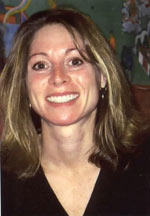Bilingual literacy ed specialist doesn't always go by the book
Maria Coady combines student field trips
with reading program for migrant farm families
Maria Coady, a bilingual education specialist, has learned that you can’t always go by the book to get things done.
Ironic, since books are a vital tool of her trade.

Maria Coady
Coady, an assistant professor at UF’s College of Education, teaches and conducts research in the field of ESOL (English speakers of other languages). She often takes her students on field trips to Florida’s migrant farm communities, studying their lifestyles and seeking better ways to teach predominantly Spanish-speaking migrant workers and their children how to understand and speak English.
She views her work as a way to help the immigrant families improve their quality of life and standing in their community, while exposing her education students to some diverse teaching and learning situations.
Coady is currently working on a literacy project called Libros de Familia (Family books). Armed with a small grant from the Florida Governor’s Family Literacy Initiative, and working with the Harvest of Hope Foundation, she delivers high-quality bilingual, multicultural literature for children in the migrant worker family homes.
The literacy project evolved from a study she conducted two years ago with five migrant worker families. Interested in literacy practices in homes, she confirmed what she’d suspected – that books and other reading materials were in short supply in their homes to support children’s literacy development.
“It was not necessarily part of their cultural practice to read books each night, like it is in so many other families,” Coady says.
With many immigrant families fearing possible deportation under the current political environment, Coady often finds herself having to build confianza (trust) before they’ll welcome her into their homes. But she has gained their trust with the help of some UF students.
While she was unpacking her boxes upon arriving at UF three years ago, a group of Latino students in several non-education fields approached her. The students had started their own language and advocacy program for Spanish-speaking migrant adults in the community, but lacked a background in teaching English.
“That was my introduction to the Spanish-speaking, migrant community in North Central Florida,” she says. “The students took on the role of buffer and together we built trust among the migrant community.”
Coady and the students passed out information at area plant nurseries and farms. Many migrant workers would scatter when they saw her coming, but over time, they warmed up to her. Now they call her when they need medical help, food, clothing or other life necessities. And Coady provides a lot of the basic networking they need to survive.
She considers it all part of her literacy project. She points families to social services, takes kids to the dentist. She says it is about having an ongoing relationship with people. Coady—who speaks fluent Spanish, English, French and a little Irish Gaelic—calls herself a scholar and a researcher, but she’s also an advocate.
“There’s no real job description, no formal time limits, and some of it might not be what UF expects of me,” she said. “But I couldn’t envision doing it any other way.”
# # #
Writers
David Greenberg & Larry Lansford, 352.376.7808, ext. 266; llansford@coe.ufl.edu




